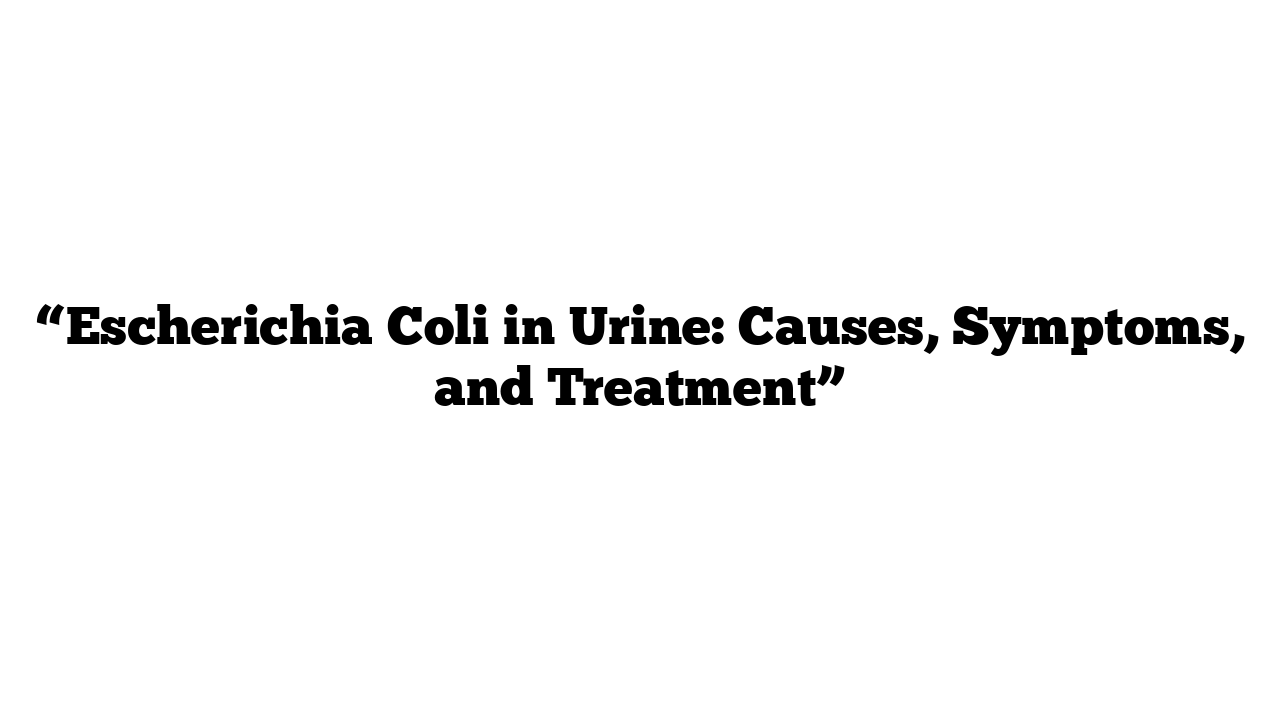Finding Escherichia coli (E. coli) in your urine is a sign of infection, typically associated with a urinary tract infection (UTI). E. coli is a bacterium commonly found in the intestines, where it plays a helpful role in digestion. However, when it enters the urinary tract, it can cause discomfort and potentially serious complications. This article explains everything you need to know about E. coli in urine, including its causes, symptoms, treatment, and prevention.
What is Escherichia Coli (E. coli)?
E. coli is a type of bacteria found naturally in the human gut and is usually harmless. However, some strains, particularly uropathogenic E. coli (UPEC), can cause infections when they spread to areas like the urinary tract.
In the USA, E. coli is responsible for nearly 90% of urinary tract infections, making it the most common culprit.
How Does E. coli Enter the Urinary Tract?
E. coli can migrate from the intestines or rectal area to the urethra, where it can travel to other parts of the urinary tract, including the bladder (causing cystitis) or kidneys (causing pyelonephritis).
Common Causes Include:
- Poor Hygiene: Wiping from back to front can transfer E. coli from the anus to the urethra.
- Sexual Activity: Increases the risk of bacteria entering the urinary tract.
- Weakened Immune System: Makes it easier for bacteria to multiply.
- Medical Devices: Catheters or stents can introduce bacteria.
- Blocked Urinary Flow: Kidney stones or an enlarged prostate can trap urine and promote bacterial growth.
Symptoms of E. coli in Urine
The presence of E. coli in urine often results in a UTI. Common symptoms include:
1. Bladder-Related Symptoms (Cystitis):
- Frequent urination
- Burning sensation while urinating
- Cloudy or foul-smelling urine
- Lower abdominal pain
2. Kidney-Related Symptoms (Pyelonephritis):
- Fever and chills
- Nausea and vomiting
- Pain in the back or side
If you notice any of these symptoms, seek medical attention promptly.
Diagnosing E. coli in Urine
A urinalysis and urine culture are the most common tests to detect E. coli.
- Urinalysis: Checks for signs of infection, such as white blood cells, red blood cells, and nitrites.
- Urine Culture: Confirms the presence of E. coli and helps determine which antibiotics are effective.
Treatment for E. coli in Urine
1. Antibiotics
The primary treatment for E. coli-related UTIs is antibiotics. Common options include:
- Trimethoprim-sulfamethoxazole (Bactrim)
- Nitrofurantoin (Macrobid)
- Ciprofloxacin (Cipro)
Your doctor will choose the best antibiotic based on the bacteria’s resistance patterns and your medical history.
2. Pain Relief
Over-the-counter pain relievers like ibuprofen can alleviate discomfort during treatment.
3. Hydration
Drinking plenty of water helps flush bacteria from your urinary tract.
Preventing E. coli in Urine
1. Maintain Good Hygiene
- Always wipe from front to back after using the restroom.
- Avoid using harsh soaps or douches in the genital area.
2. Stay Hydrated
Drinking enough water ensures frequent urination, which helps eliminate bacteria.
3. Empty Your Bladder Regularly
- Don’t hold in urine for long periods.
- Always urinate after sexual activity.
4. Consider Cranberry Products
While not a guaranteed prevention, some studies suggest cranberry juice or supplements can help reduce UTIs by preventing bacteria from adhering to the bladder wall.
Complications of Untreated E. coli in Urine
If left untreated, E. coli infections can lead to serious complications, including:
- Kidney Infections (Pyelonephritis): Can cause permanent kidney damage.
- Sepsis: A life-threatening condition if the infection spreads to the bloodstream.
- Chronic UTIs: Repeated infections that impact quality of life.
Visit “medicaltimes.io” for More Insights
For additional resources on UTI prevention, treatments, and related health topics, visit medicaltimes.io.
Top 10 FAQs About E. coli in Urine
1. Is E. coli in urine always a sign of infection?
Yes, E. coli in urine typically indicates a urinary tract infection.
2. Can E. coli infections go away on their own?
Mild cases might resolve without antibiotics, but treatment is recommended to prevent complications.
3. Are UTIs caused by E. coli contagious?
No, UTIs are not contagious, but the bacteria can be passed during sexual activity.
4. How long does it take to recover from an E. coli UTI?
With antibiotics, symptoms often improve within 48 hours, but full recovery may take a week.
5. Can men get E. coli in their urine?
Yes, but UTIs are more common in women due to their shorter urethra.
6. What foods can help prevent E. coli infections?
Foods rich in probiotics, like yogurt, and plenty of water can support urinary health.
7. Should I avoid certain foods during treatment?
Yes, avoid caffeine, alcohol, and spicy foods as they can irritate the bladder.
8. Can E. coli cause complications during pregnancy?
Yes, untreated UTIs during pregnancy can lead to preterm labor or low birth weight.
9. What’s the role of probiotics in preventing UTIs?
Probiotics may help maintain a healthy balance of bacteria in the gut and urinary tract.
10. When should I see a doctor?
Seek medical care if you experience severe pain, fever, or recurrent infections.
